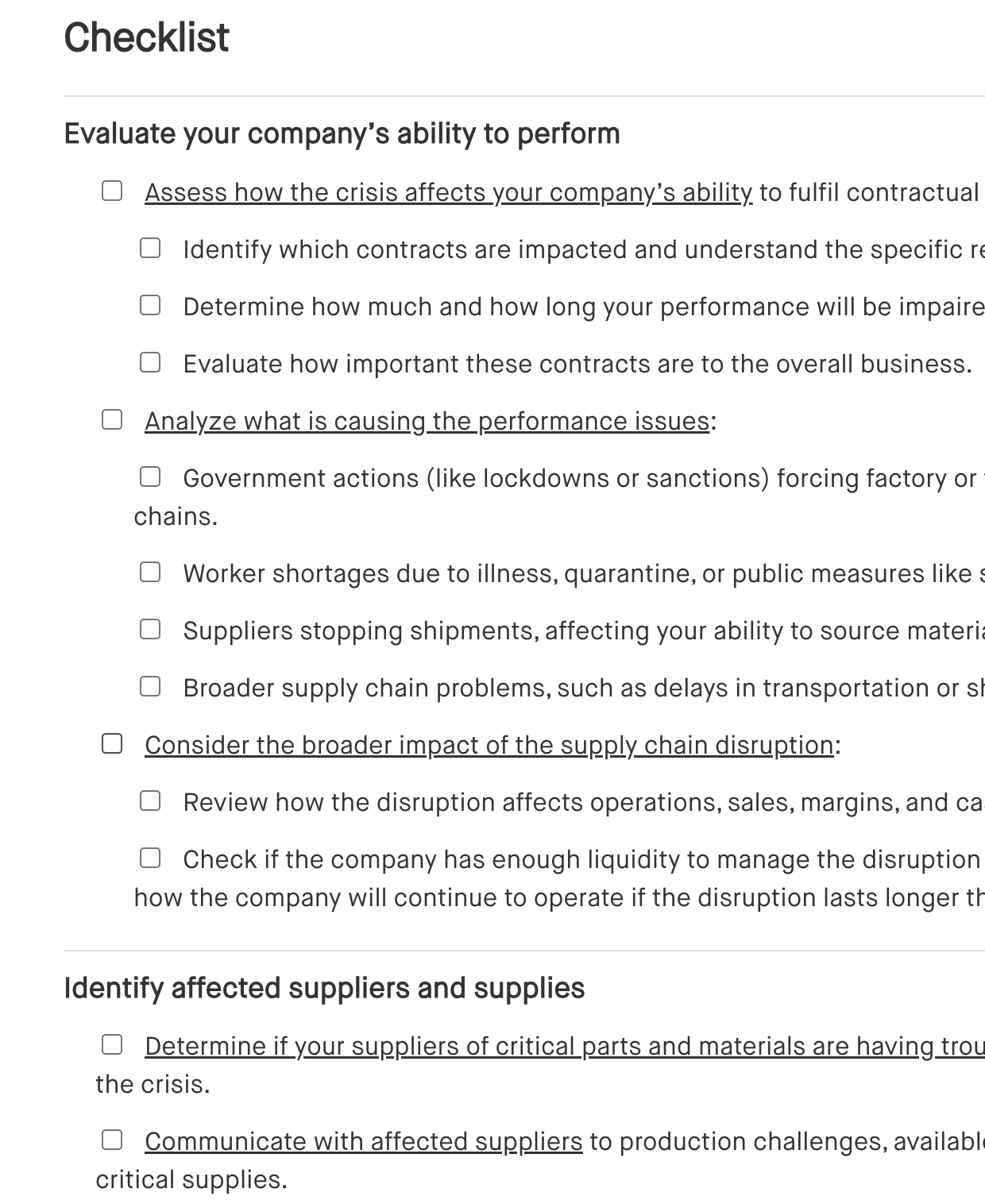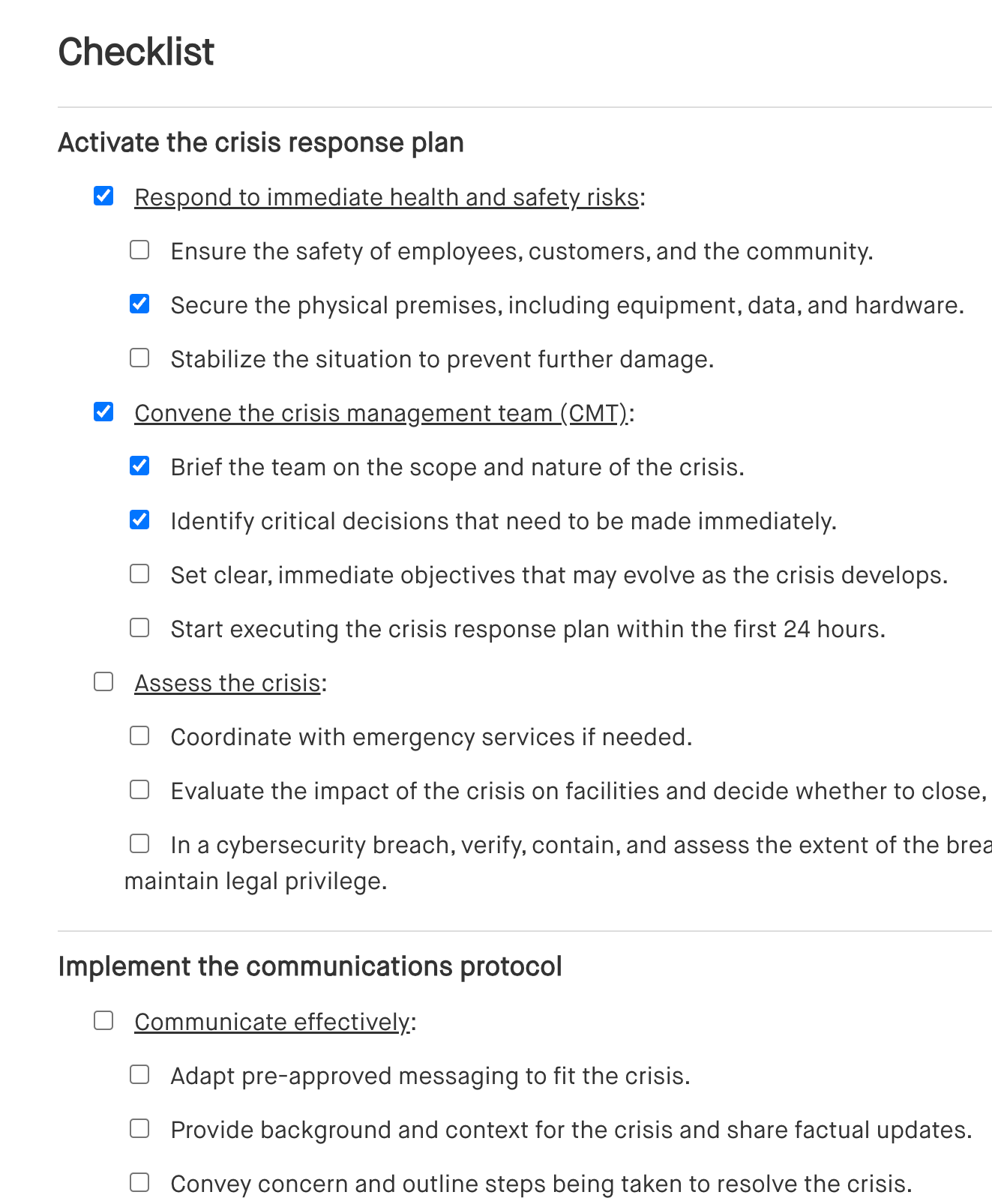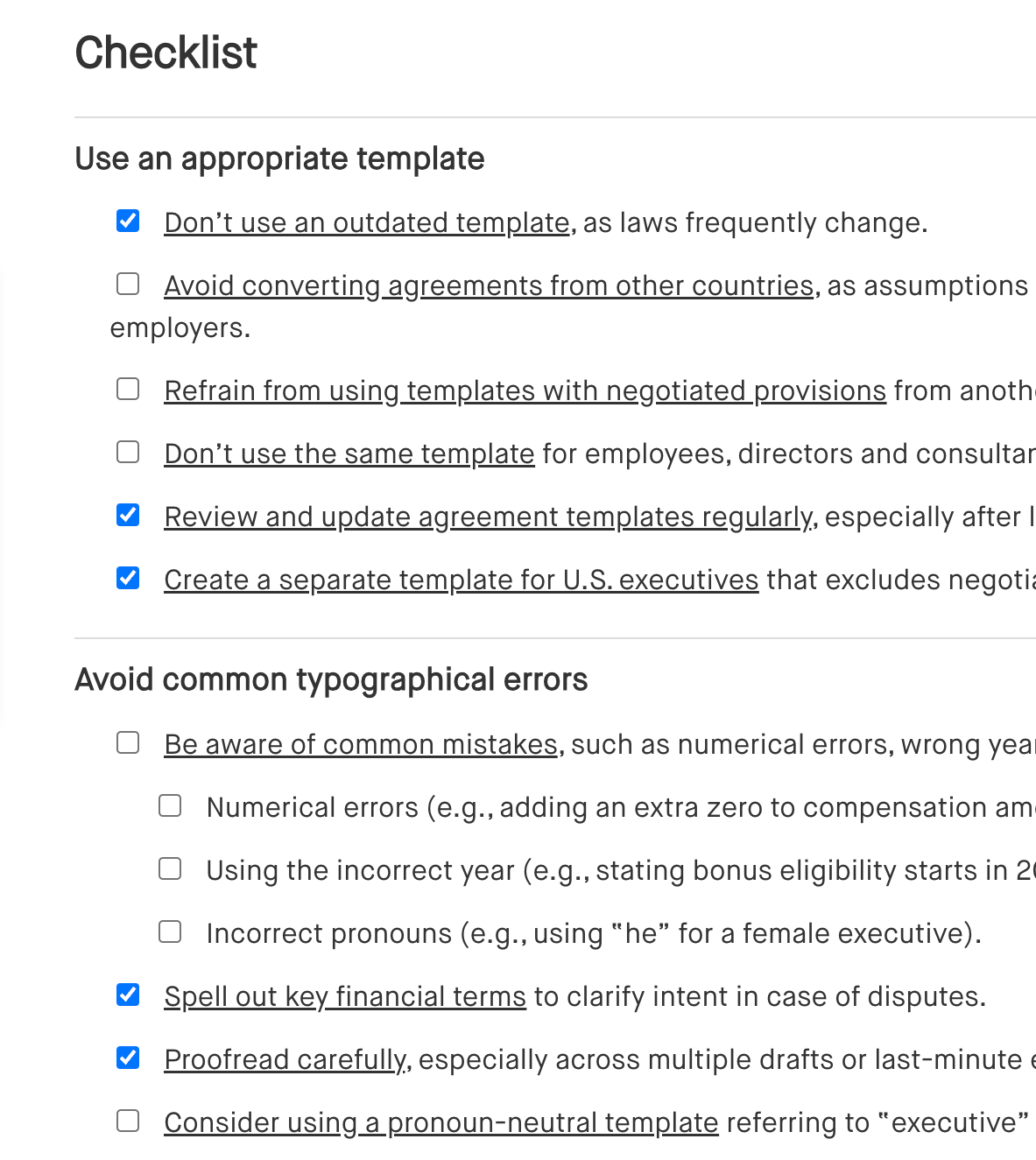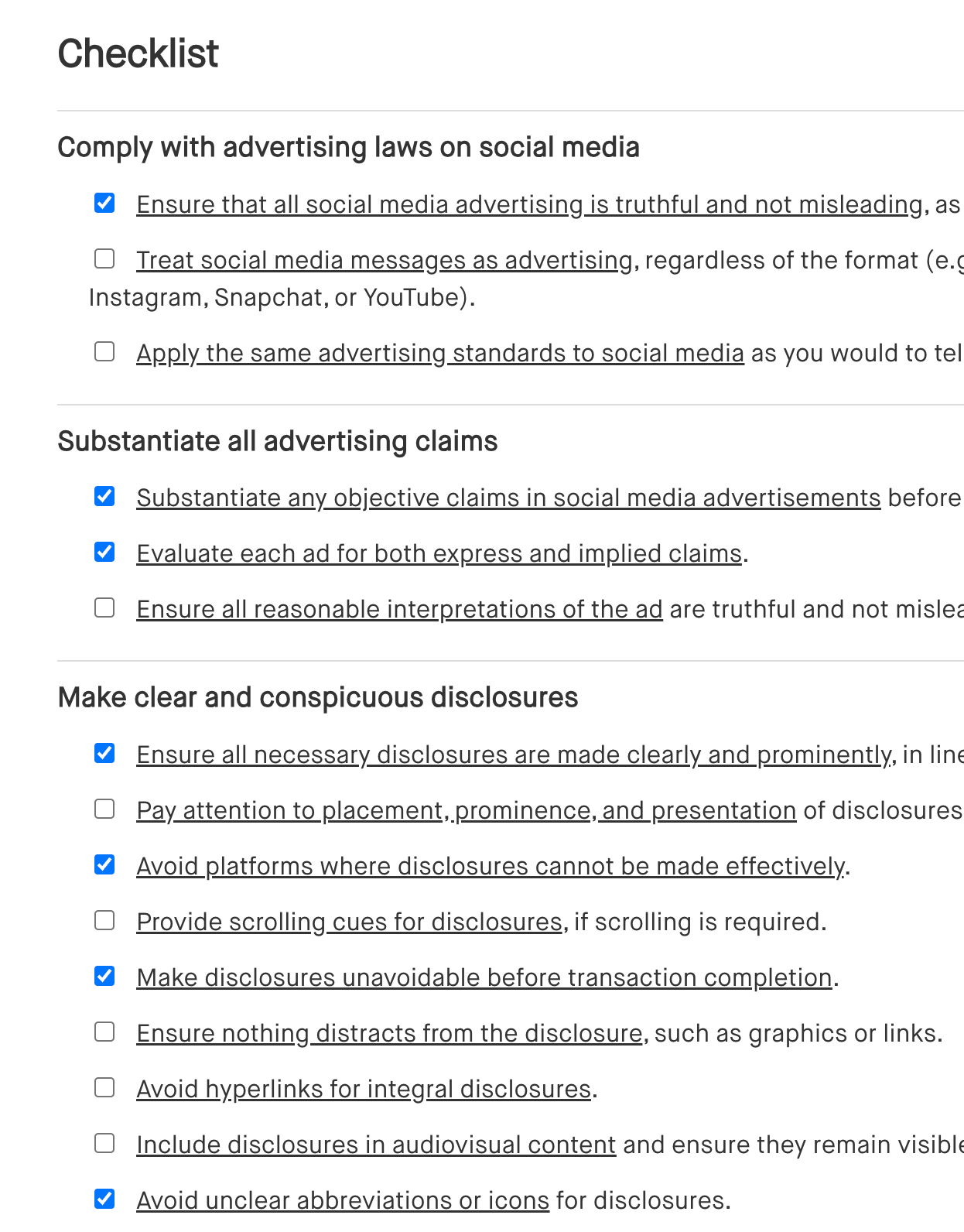Start a new document with this content. Open the editor to build from scratch — paste in what you need and keep writing.

Supply chain disruption checklist
Crises like natural disasters, pandemics, or civil unrest can seriously disrupt your supply chain. To manage these risks and keep your business running smoothly, it’s essential to assess the situation, review your contracts, and work closely with suppliers and customers.
This supply chain disruption checklist helps you tackle key issues: understanding the disruption, ensuring you’re covered by insurance, stabilizing your supply chain, and preparing for potential legal disputes.
How to use this supply chain disruption checklist
- Follow the steps in sequence: Begin by evaluating the impact of the crisis on your company's ability to meet its contractual obligations. Then move through the checklist to review contracts, insurance policies, and assess customer and supplier relationships.
- Customize to fit your business: Crises affect each business differently. Adapt this checklist to suit your industry, supplier relationships, and the scale of the disruption. Prioritize key contracts and critical suppliers that have the greatest impact on your operations.
- Involve key stakeholders: Bring in your legal, operations, finance, and procurement teams to ensure a comprehensive approach. Each department will provide insights to help assess risks and respond effectively.
- Prepare for ongoing management: Use the checklist as a working tool throughout the crisis. Regularly update it as the situation evolves, and integrate the insights into your crisis planning to improve your supply chain's resilience for future disruptions.
Checklist
Evaluate your company’s ability to perform
[ ] Assess how the crisis affects your company’s ability to fulfil contractual responsibilities:
[ ] Identify which contracts are impacted and understand the specific responsibilities under these contracts.
[ ] Determine how much and how long your performance will be impaired.
[ ] Evaluate how important these contracts are to the overall business.
[ ] Analyze what is causing the performance issues:
[ ] Government actions (like lockdowns or sanctions) forcing factory or facility closures, or cutting off supply chains.
[ ] Worker shortages due to illness, quarantine, or public measures like school or transport closures.
[ ] Suppliers stopping shipments, affecting your ability to source materials or products.
[ ] Broader supply chain problems, such as delays in transportation or shipping halts.
[ ] Consider the broader impact of the supply chain disruption:
[ ] Review how the disruption affects operations, sales, margins, and cash flow.
[ ] Check if the company has enough liquidity to manage the disruption and any additional crisis fallout. Plan for how the company will continue to operate if the disruption lasts longer than expected.
Identify affected suppliers and supplies
[ ] Determine if your suppliers of critical parts and materials are having trouble meeting their responsibilities due to the crisis.
[ ] Communicate with affected suppliers to production challenges, available inventory, and options to secure critical supplies.
[ ] Assess the availability of critical parts and materials:
[ ] Check if substitute parts or alternative suppliers are available.
[ ] Determine if you need to ration critical parts.
[ ] Evaluate if certain products can no longer be produced due to shortages.
[ ] Review potential issues with logistics providers:
[ ] Consider problems from heightened port security.
[ ] Check for delays due to government lockdowns.
[ ] Account for import/export clearance delays.
[ ] Identify other trade barriers related to the crisis.
Assess impact on customers
[ ] Communicate with your customers to figure out which customers still need goods, which can no longer take goods, and whether there’s been a change in demand for your products.
[ ] If you have a limited quantity of goods, decide how to allocate them by considering existing contractual agreements, any legal requirements, and the importance of strategic customer relationships.
[ ] Notify customers as early as possible about any delivery disruptions, including expected delays.
[ ] Monitor your customers’ situations to assess if they can:
[ ] Pay for the goods.
[ ] Take delivery of the goods.
[ ] For customers at risk of default, consider remedies like demanding assurance of their ability to perform, stopping goods in transit, and reclaiming delivered goods, if necessary.
[ ] Prepare contingency plans in case any customers cancel orders, including identifying alternative buyers for your products.
Review upstream and downstream contract terms
[ ] Review supplier and customer contracts under applicable law to understand your rights and obligations. Pay attention to key provisions such as:
[ ] Representations and warranties.
[ ] Covenants and exclusivity clauses.
[ ] Payment rights, schedules, and delivery terms.
[ ] Force majeure clauses and limitations of liability.
[ ] Allocation rights and termination rights.
[ ] Check insurance and indemnification clauses to see if:
[ ] One party needs to list the other as an additional insured to cover crisis-related losses.
[ ] Either party has an indemnification claim for crisis-related breaches.
[ ] Identify customer contracts with severe penalties for late delivery or non-performance, like liquidated damages.
[ ] Map contract analysis against business priorities to identify commercially important contracts, prioritize resources and efforts, and minimize the short and long-term impacts of the crisis on your business.
[ ] Monitor federal and local regulations that might change your responsibilities, including any health and safety measures related to the crisis.
[ ] Check if other laws apply, like The Uniform Commercial Code (UCC) or state adaptations, or The United Nations Convention on Contracts for the International Sale of Goods (CISG).
Review force majeure clauses
[ ] Determine if the crisis triggers the force majeure clause by checking if it’s:
[ ] Specifically listed as a force majeure event (e.g., "war," "invasion," or "hostilities").
[ ] Covered under general catch-all terms like "acts of God," "acts of government," or "circumstances beyond a party’s control" (note these are often narrowly interpreted by courts).
[ ] Specifically excluded as a force majeure event.
[ ] Analyze the force majeure clause to determine whether the crisis triggers it and what performance it excuses.
[ ] Weigh the potential relief and consequences of invoking force majeure:
[ ] It may temporarily excuse performance and prevent default termination, providing more time to perform.
[ ] It may trigger the right to terminate (usually by the non-invoking party, but sometimes by either party) if the event continues beyond a certain time.
[ ] It may affect how liquidated damages are applied and interact with force majeure.
[ ] It may impact financial agreements, insurance, or other obligations.
[ ] It could result in litigation costs if the clause is disputed.
Consider other defences for non-performance
[ ] If the contract does not have a force majeure clause, explore other potential defenses for non-performance, which are often limited and narrowly enforced, including:
[ ] Impossibility: Argue that it is literally impossible to fulfill the contract due to the crisis.
[ ] Frustration of Purpose: Claim that the crisis has fundamentally changed the circumstances, making the contract’s original purpose no longer relevant or achievable.
[ ] Impracticability: Argue that performing the contract has become unreasonably difficult or expensive due to the crisis.
[ ] Article 79 of the CISG: If the contract is governed by the United Nations Convention on Contracts for the International Sale of Goods (CISG), consider using Article 79, which provides an exemption for non-performance if an unforeseen event makes performance impossible.
Respond to notices invoking non-performance defences
[ ] If you’ve received a notice from a customer or supplier saying they can’t perform their contractual responsibilities, ask the impacted party for:
[ ] Evidence showing the reasons they cannot perform, including details about affected facilities, employees, parts, or materials.
[ ] The expected delay period, as required by the force majeure clause.
[ ] Information on how they plan to allocate limited stock, if they are a supplier.
[ ] Regular updates on their efforts to resume performance and reduce the impact of non-performance.
[ ] Any additional or supplemental information that becomes available.
[ ] Evaluate the claim:
[ ] Determine if the crisis activates the force majeure clause or any other defense for non-performance.
[ ] Check if the claim meets the requirements of the force majeure clause or other invoked defense (refer to force majeure clauses for details).
[ ] Consider your options if the claim doesn’t seem valid:
[ ] Decide if enforcing the contract is feasible.
[ ] Weigh the risk of damaging long-term relationships by strictly enforcing your rights.
[ ] Prepare for downstream notices:
[ ] Be ready to send force majeure notices to your own customers or suppliers if needed.
[ ] Keep in mind that contracts down the supply chain may have different terms or governing laws, creating potential challenges.
[ ] Be cautious with your wording to avoid prejudicing your position in future disputes with suppliers.
Check insurance coverage
[ ] Assemble a risk management team: Include members from corporate risk management, the insurance broker, corporate finance, a forensic accountant, external counsel, and risk consultants to help manage and quantify the insurance claim.
[ ] Identify applicable policies: Look for company policies that cover crisis-related losses or liabilities to third parties, including:
[ ] Business interruption (BI) insurance for losses caused by direct physical damage to your property.
[ ] Contingent BI insurance for losses due to damage at the property of your suppliers or customers.
[ ] Supply chain insurance, which covers supply chain disruptions without needing physical loss.
[ ] BI civil authority coverage for losses when you can't access your property due to government orders.
[ ] BI ingress/egress extensions for losses when your property becomes inaccessible.
[ ] Specialty coverages such as:
[ ] Force majeure insurance.
[ ] Political risk insurance.
[ ] Event cancellation insurance.
[ ] Performance bonds.
[ ] Explore other insurance options:
[ ] Engage with your supply chain partner’s risk management team to explore potential coverage.
[ ] Request and review your supply chain partner’s insurance policies.
[ ] Identify third-party liability policies: Check for liability coverage for third-party crisis-related losses, including:
[ ] Commercial general liability insurance for claims of negligence leading to illness or injury.
[ ] Directors and officers (D&O) insurance for coverage in case of lawsuits from investors, shareholders, or customers.
[ ] Errors and omissions (E&O) insurance to protect against claims of failing to take appropriate actions during the crisis.
[ ] Employment practices liability insurance for claims by employees impacted by shutdowns or layoffs.
[ ] Comply with policy conditions:
[ ] Check the types of losses covered, limited, or excluded under your policies.
[ ] Notify the insurer of actual or potential claims within the required time frame.
[ ] Consult with the insurer to understand your obligations to reduce loss or damage.
[ ] Follow all other conditions outlined in the policy.
Stabilize the supply chain
[ ] Work with suppliers and customers to find practical solutions for legal issues, like adjusting performance obligations (e.g., partial performance or temporary modifications).
[ ] Aim to resolve disputes cooperatively, protecting relationships and increasing the chance of successful resolutions.
[ ] Prepare for the crisis (if there’s enough lead time):
[ ] Identify alternative sources for critical goods and speed up onboarding of suppliers in regions less impacted by the crisis.
[ ] Ensure your business has the necessary equipment, tooling, materials, and knowledge to transition smoothly to new suppliers.
[ ] Secure the right to use (or sublicense) a supplier's intellectual property, if needed.
[ ] Review transportation options to avoid delays or disruptions.
[ ] Reallocate resources and shift production to focus on high-value or strategically important products.
[ ] Support key suppliers facing difficulties:
[ ] Provide personnel or equipment to help the supplier.
[ ] Speed up payments to the supplier.
[ ] Offer short-term loans to cover expenses or help restart production.
[ ] Consider acquiring a position in the supplier’s existing debt.
[ ] Protect customers:
[ ] Waive penalties for order cancellations where possible.
[ ] Offer extended payment terms.
[ ] Consider flexible pricing models to help customers navigate the crisis.
[ ] Work closely with suppliers to manage supply levels as production ramps back up, addressing potential spikes in orders due to pent-up demand.
[ ] Manage global communications across your organization to ensure a unified message and approach when dealing with suppliers and customers.
Minimize risk and prepare for litigation
[ ] Consider the cost of mitigating the disruption (e.g., finding alternative supply sources) versus the potential expense of defending a breach of contract claim.
[ ] Understand that disputes are common, and many disputes are resolved through operational or commercial discussions. Some disputes may escalate into litigation or arbitration.
[ ] Follow standard legal procedures to safeguard the company’s evidence and legal standing in a potential dispute.
[ ] Document everything. Keep clear, detailed records of any losses or disruptions and include:
[ ] The scope of the disruption to the business.
[ ] The factors that led to non-performance.
[ ] All incurred and anticipated costs.
[ ] Avoid unintentional commitments:
[ ] Be cautious when making statements or promises that could be interpreted as waiving contractual rights.
[ ] Put all oral discussions about contract changes or resolutions into writing.
[ ] Formalize resolutions:
[ ] Ensure any resolutions accurately reflect the agreement and include reservations of rights where necessary.
[ ] Check dispute resolution clauses:
[ ] Review the contract’s dispute resolution terms to identify the appropriate court or tribunal.
[ ] Assess how the adjudicator might approach the dispute.
Plan for the next crisis
[ ] Conduct a post-incident review and update internal processes and incident response programs to better manage future crises.
Benefits of using a supply chain disruption checklist
Using a supply chain disruption checklist provides clear guidance during challenging times—here’s how it helps.
- Stay organized during a crisis: In times of disruption, it’s easy to lose track of important details. A checklist ensures that every critical step is covered, from assessing impacted contracts to communicating with suppliers and customers. This structure helps you avoid overlooking key actions, enabling smoother crisis management.
- Minimize risk and protect your business: Systematically addressing areas like contract terms, insurance coverage, and customer commitments helps mitigate risks. By using the checklist, your company can better anticipate potential legal or financial challenges, prevent breaches of contract, and safeguard relationships with key partners and clients.
- Learn and prepare for future crises: Each disruption offers lessons that can strengthen your business. A checklist encourages continuous improvement by documenting how the crisis was managed, identifying weak points, and updating response strategies. This helps ensure that your company is more resilient and better prepared for future disruptions.
Frequently asked questions (FAQ)

Outlines steps to respond to a business crisis, including assessing the situation, communicating with stakeholders, implementing a crisis management plan, and taking corrective actions to mitigate impact.

Outlines key components for drafting an executive employment agreement, including compensation, benefits, responsibilities, and termination terms.

Outlines the essential steps for planning and executing advertising and promotions on social media, promoting compliance, effective targeting, and tracking of results.